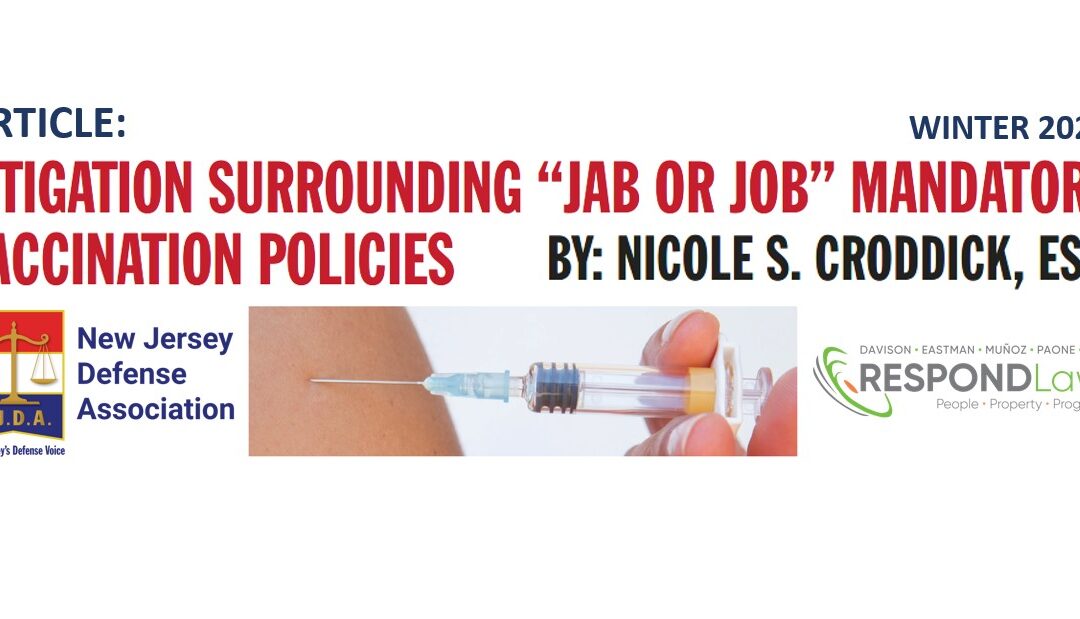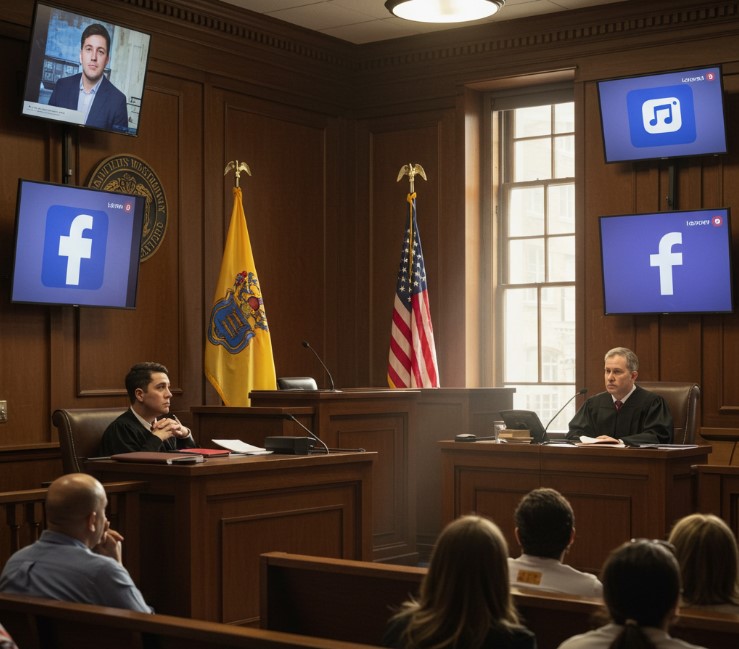Title VII of the Civil Rights Act of 1964, the Americans with Disabilities Act, and the New Jersey Law Against Discrimination prohibit harassment and discrimination in employment against enumerated legally protected classes. These protected classes include both disability and religion. The laws further mandate employers to attempt to provide employees with “reasonable accommodations” for either disability or religious reasons. A “reasonable accommodation” is an employee-requested job adjustment, exception, modification or change made to a job, the work environment, the way a job is done, or the processes, rules, practices and policies that are implemented and enforced in a workplace. Employees’ request “reasonable accommodations,” in oral or written form, when they believe that an employment modification or change is necessary for either “sincerely held religious beliefs” (practices or observances) or for certain medical conditions (disability reasons).
Once an employee requests a “reasonable accommodation,” this does not mean that the employer must automatically provide the requested modification. That said, it does mean that the employer and employee must begin the legally required interactive process. Once an employee takes the first step in the process, by requesting a “reasonable accommodation,” both the employee and employer must engage in an “interactive process” to endeavor to find a “reasonable accommodation” that would be both suitable for the employee’s religious or medical needs as well as the performance of the essential requirements of the job, while balancing the hardship such an accommodation would place on the employer. An employer must grant the agreed upon “reasonable accommodation” as long as doing so would not cause the employer an “undue hardship.”
During the COVID-19 pandemic, once COVID-19 vaccines were readily available, through the present time, numerous public and governmental agencies and private companies required employees to be “fully vaccinated” against the COVID-19 virus as per CDC guidelines. This mandatory vaccination requirement was at times rooted in various state, local and federal laws, but was at other times simply based on an employer’s implemented policy. The purpose of mandatory COVID-19 vaccination policies is to protect the health and safety of all employees, clients, customers, and visitors from COVID-19 and to prevent ! limit the spread of the COVID-19 virus.
In response to employer implemented mandatory vaccination requirement policies and the corresponding anti-discrimination laws, employees could apply for an exemption by way of a “reasonable accommodation” from the mandatory vaccination policy for religious or medical reasons. Often the reasonable accommodation would be a request for an exemption from the vaccination policy coupled with additional health and safety requirements for employees to reduce the spread of COVID-19. Examples of additional measures could include: weekly COVID-19 testing; the wearing of a face covering; and working from home. The “reasonable accommodation” could be requested by the employee for either a medical condition or a “sincerely held religious belief.” Generally, once the “reasonable accommodation” was requested (for example, an exemption to the vaccine mandate), the employee was required to fill out a form formally requesting the accommodation ! exemption. Thereafter, the employer and the employee should engage in an informal and interactive discussion to see if an accommodation was possible, reasonable and appropriate without causing the employer “undue hardship.” In the end, the employer could either grant or deny the employee’s request for a reasonable accommodation ! exemption to the policy.
Requests for reasonable accommodations, in the form of exemptions based on medical conditions (disabilities) were generally granted, by most employers, without much thought or concern. This is because such requests were usually accompanied by supporting medical documentation from a treating physician that supported the claim that the COVID-19 vaccine would pose a health risk to the employee because of their particular medical condition ! disability. An example would be if an individual could not be administered the vaccine because the employee was allergic to certain ingredients in it.
On the other hand, numerous employers struggled with requests for exemptions based on “sincerely held religious beliefs.” There are several reasons for the challenges employers faced with these requests. One reason is because the request for a reasonable accommodation is for a “sincerely held religious belief,” even if the religious belief is not “accurate.” For example, certain employees claimed that they did not want to be vaccinated because the vaccine, or the vaccine prototypes, contained cells from unborn fetuses. Another complexity is because religious reasonable accommodation / exemption requests are personal in nature and did not have to be supported by documentation from a place of worship or a religious leader. These accommodation requests would often contain reasons for the request accompanied by personal beliefs and quotes from the bible. An example may include the bible verses such as: “my body is a temple that should not receive foreign or unnatural substances” and “God will protect the body from illness.”
Such religious-based “reasonable accommodation” requests were often scrutinized by employers due to the sincerity of the religious belief. That said, the majority of such requests were granted, after the proper interactive process was followed, because of the personal nature of the sincerely held religious belief.
Once vaccination mandates became routine, especially in health care and higher education fields, there were various employers, including Indiana University, United Airlines and a local pharmaceutical company, Bristol-Meyers Squibb (“BMS”) that denied “reasonable accommodation” requests based on “sincerely held religious beliefs.” As such, those employees who refused the COVID-19 vaccination and whose request for a “reasonable accommodation” were denied, were terminated from employment. A number of those terminated employees filed class action lawsuits against their employer.
The legal trends that correspond with COVID-19 vaccination litigation are that the majority of the lawsuits are based on the employer’s response to religious objections to the vaccine mandate, where the desired relief was a court-ordered injunction to stop enforcement of the vaccination policy. The majority of the courts did not grant the requested injunctions. This trend undoubtedly sent the message to many private-sector employers that they do not have to fear liability for rejecting “reasonable accommodation” requests that they believe lack merit or would cause an undue hardship. Despite this message, it is clear that lawsuits still cost significant money to defend and / or settle and that the informal, interactive process must be followed by both employer and employee in all cases.
In July 2022, a $10.3 million legal settlement was approved for lead plaintiffs / former employees, in a class action lawsuit. Those employees were previously denied religious accommodations / exemptions from mandatory COVID-19 vaccination requirements by healthcare employer Illinois-based NorthShore University HealthSystem. Those employees were then terminated because the employer did not grant them a “reasonable accommodation” by way of an exemption to the mandatory vaccination requirement and they did not get vaccinated. In the NorthShore case, the plaintiffs alleged that the employer made a general statement that it would deny any religious exemption requests based on “aborted fetal cell lines” and thereafter only permitted remote work as a reasonable accommodation where feasible. This settlement included the option for the employee’s rehire, which was approved by a judge in the U.S. District court for the Northern District of Illinois.
The significance of this class action settlement is that it was the first-class action settlement in the U.S. against a private employer who mandated a COVID-19 vaccine policy (informally known as “jab or job” policies). The practical take away, and strong warning, is that employers must follow the legal mandates of Title VII and other anti-discrimination laws. Specifically, employers cannot implement blanket policies that mandate the COVID-19 vaccine or be terminated. Rather, employers must individually consider each particular request for a religious or medical reasonable accommodation / exemption on a case-by-case basis guided by the applicable laws and policies.
Recently, and in our own jurisdiction, litigation continues against pharmaceutical giant Bristol-Meyers Squibb (“BMS”) surrounding their COVID-19 vaccination mandate. The lawsuit alleges religious discrimination and failure to accommodate under Title VII of the Civil Rights Act and the New Jersey Law Against Discrimination. In the BMS case, former BMS employees (originally 4 employees but that number is now increasing) allege that BMS failed to follow the informal interactive reasonable accommodation process by refusing to entertain vaccination exemption requests based on sincerely held religious beliefs. The employees opposed vaccination based on a variety of religious reasons including alleged links to aborted fetus and stem cells; Born Again Christian religious tenets; and the bible passage indicating “my body is my temple.” The employees allege that BMS did not engage in the required back and forth discussion with the employee to ascertain if a “reasonable accommodation” would be possible. The plaintiffs stated that instead, BMS advised them that they failed to proffer a sincerely held religious belief that would qualify for a reasonable accommodation / policy exemption. The plaintiffs additionally alleged that BMS asserted that there was not a possible “reasonable accommodation” that could be implemented which would enable the employees to perform their essential job duties; would not risk the health and safety of the workforce and those they serve; and would not cause BMS an undue hardship (unreasonable expense / operational hardship). The essence of the BMS lawsuit is not whether or not the religious exemption request was valid, but rather whether BMS followed the legally-required interactive process and did not even try to find a “reasonable accommodation” for the former employees. Legal precedent dictates that employers should not judge the personal and sincere nature of the employee’s religious beliefs. Therefore, the central legal question is, did the employer endeavor to find a “reasonable accommodation” using the interactive process or simply resist the request.
It is predicted that we will be seeing many more similar lawsuits in the near future as the U.S. Equal Employment Opportunity Commission is finally issuing the required “right to sue letters” to plaintiffs.
What can we as employers learn from all of this? First, COVID-19 litigation is far from over, but rather is just beginning, so employers would be prudent to follow the legal trends. Next, employers can implement mandatory COVID-19 vaccination policies, but said policies must be consistently applied and must allow for reasonable accommodation / exemption requests for sincerely held religious beliefs and for medical reasons. Finally, employers are required to have a “reasonable accommodation” request process in place in which the employer considers each request individually and each request is subject to an informal and interactive process, in which the employee and employer endeavor to ascertain in earnest if a reasonable accommodation can be implemented.
By: Nicole S. Croddick, Esq.
Of Counsel
Labor and Employment Law Department
Davison, Eastman, Muñoz, Paone, P.A.













